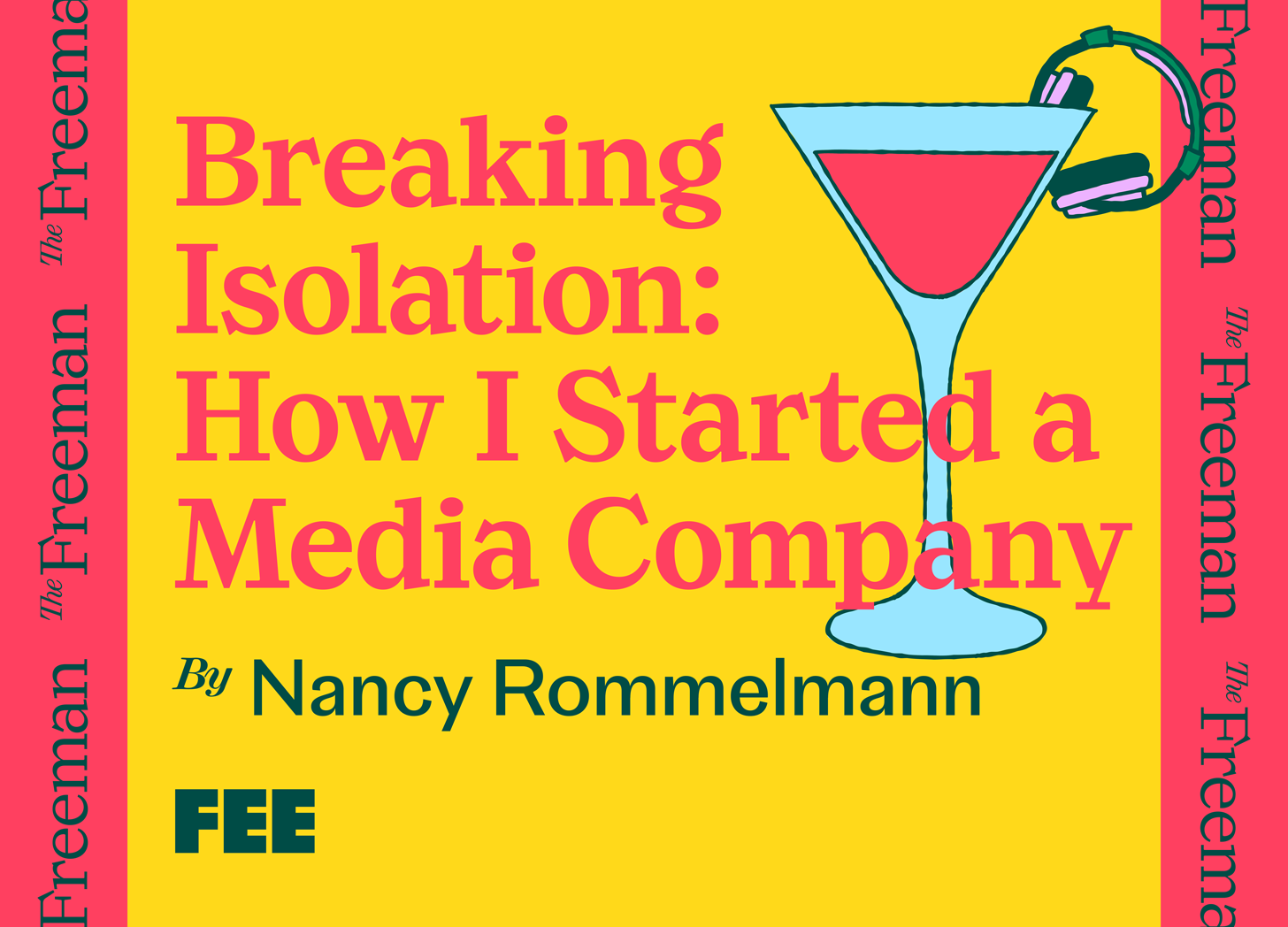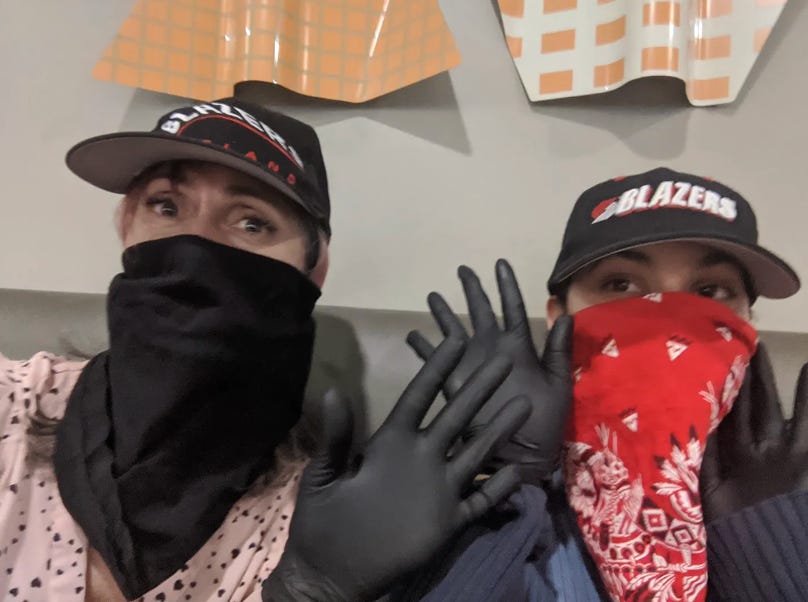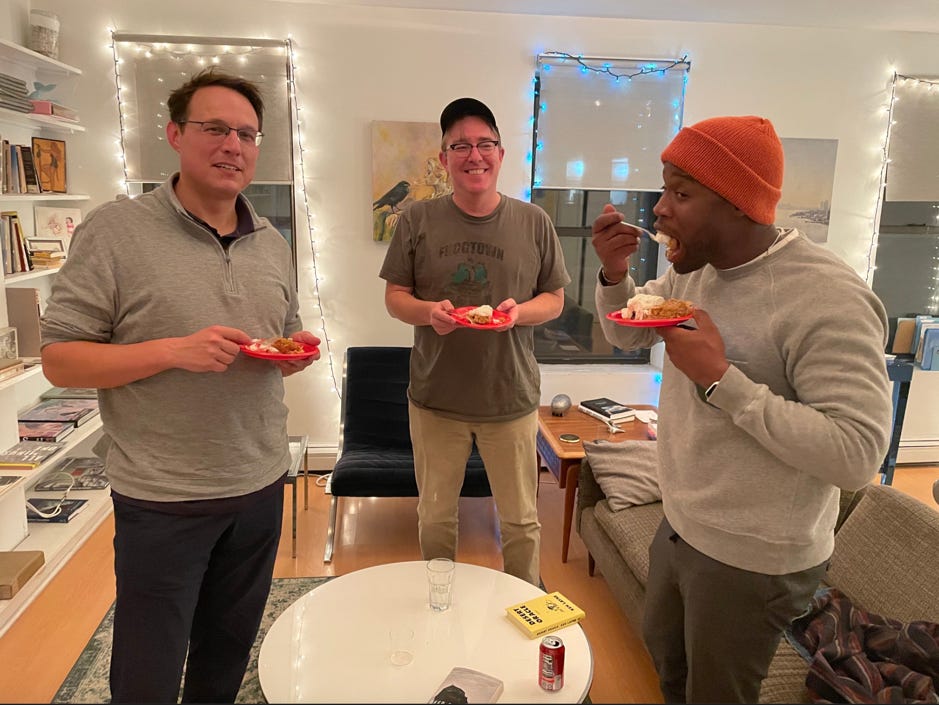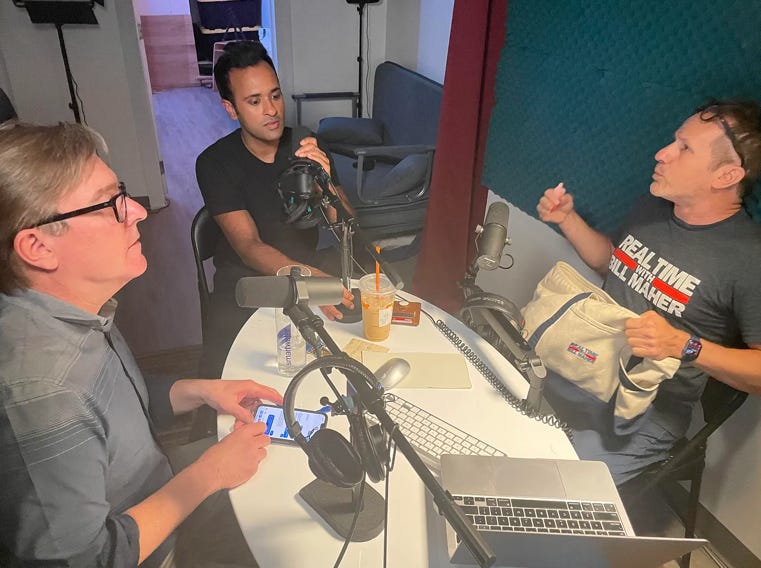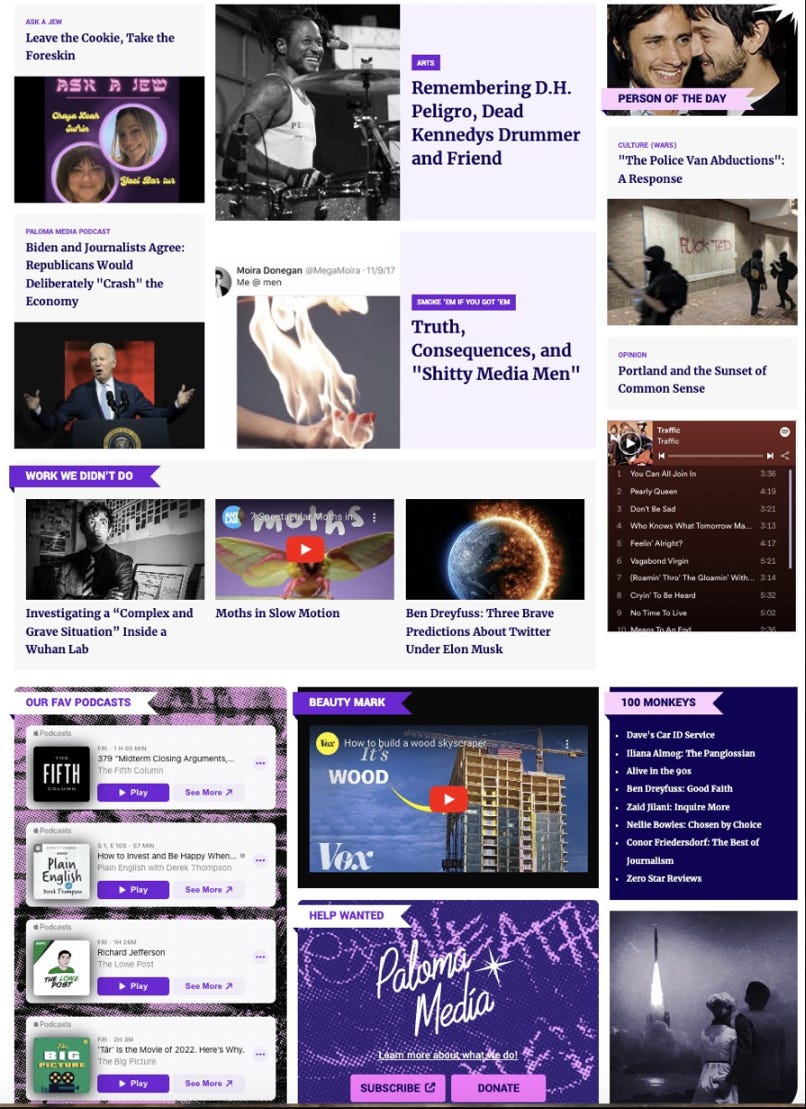Breaking Isolation: How I Started a Media Company
by Nancy Rommelmann
January 2019:
Journalists pack the Olive Tree, upstairs from New York’s Comedy Cellar, for the occasional “thought criminals” nights put on by Bari Weiss, then at the New York Times. It’s casual, cocktails and hummus and jet-engine levels of talking. At one point Bari calls attention to their being three people in attendance currently in the barrel, how it’s a weird time in media, in the culture. The people she refers to sit at one end of the communal table: Jesse Singal, John McWhorter, and me. Our crimes, respectively, are raising questions about transgender youth medicine; language policing; and the excesses of #MeToo. Everyone goes back to talking, including, later, Bari, Reason’s Matt Welch, and myself at the bar, where the conversation goes something like: Seems like the walls are really closing in, heh? But maybe we’re imagining it? What do you think?
I don’t know what to think. I am just now making my way back to New York—I’ve been writing nationally for 25 years, the past 15 while living in the media desert that is Portland, Oregon—and regardless of whether everything in journalism is turning upside down, I want to be part of it.
Spring/Summer 2019:
The walls in Portland close in, locals and local media deciding the way to express their outrage over a short-lived video podcast I did with journalist and soon-to-be Real Housewife of New York Leah McSweeney is to boycott my husband’s business. A public cancellation feels like being on fire and falling at the same time. As we watch the business slip away, as I cover black bloc and Proud Boys cosplaying along the Portland waterfront, I write an essay for Tablet magazine that they give the prescient title, “Portlandization: It Can Happen to a Place Near You.”
August 2019:
I pack two bags of clothes and the research for my most recent book and drive to NYC.
September 2019:
“I want to build something new, and I want to do it with you,” Matt said, sometime in the spring, an idea we start to manifest in his living room in Brooklyn, filing for a nonprofit LLC with the ridiculous working title Endeavor Thrust. When the paperwork requires a third officer, we add the name of a friend and don’t tell him.
October 2019:
An apartment ad pops through on my phone: one-bedroom, Chinatown. “Your mom is so cool,” my daughter’s friends say, when I take the place on Dimes Square, a designation that means nothing to me but which is apparently the epicenter of every new happening in New York.
December 2019:
At one of our steak lunches at Keen’s in Midtown, Matt and I come up with a proper name for whatever it is we are building: Paloma Media. We sketch out topics to cover: Politics. Cancel Culture. Media. Balls (sports). Hot Chicks/Cold Takes. “The real job we have is to make goodness attractive in the so-called new millennium,” he says. Also trustworthy and fun and whatever the opposite of canceling people is.
January 2020:
The bug for media building is apparently contagious. Every week we hear of tech bros and Texas billionaires wanting to fund promising prospects. People start asking about Paloma: How much do we need to launch? Two million? Twenty? Would we like to take over Gawker? Are we interested in having offices in the World Trade Center? What I really want is to punk-rock it in an abandoned drugstore in Chinatown, pirate radio for the new millennium. What I want is for no one to tell me what I’m allowed to think and write and talk about.
January 26, 2020:
Kobe Bryant, his 13-year-old daughter, and seven others are killed in a helicopter crash. A journalist at the Washington Post uses the moment to remind her Twitter followers that Bryant was once accused of sexual assault. When people tweet back that she might have waited for the helicopter to no longer be on fire, she claims she’s under assault, a claim supported by untold thousands on social media and a week’s worth of cautionary op-eds, reminders that to challenge anyone’s self-identification as a victim is antediluvian and monstrous and did we want to be on the wrong side of history? I have thoughts…
March 8, 2020:
It’s confirmed: Covid is in New York City. Nevertheless, a planned meet-up at a SoHo bar for fans of The Fifth Column podcast, which Matt co-hosts with Michael Moynihan and Kmele Foster, goes ahead as scheduled. People are understandably excited to meet the hosts. That, and the sense that we are on the precipice of something very bad, creates a sort of “The ship is going down!” frenzy where we drink all the booze and slow-dance with strangers and do everything but lick one another’s faces and probably some of that, too.
March 9, 2020:
Everyone goes inside. The stock market crashes. Italy is under quarantine. We enter a terror phase, and the mind goes to bad places, places encouraged by the news. But also? “Let’s launch a fucking publication, right now, fuck it,” Matt texts. He recalls that Salon.com was launched in 1995 because the SF Examiner was on strike and some staffers were bored. “Make Paloma about the Coronavirus first, hire Katie [Herzog] on a freelance basis (as the only paid employee),” he says. “Figure it out on the fly.” I call Katie, offer her a job. She says yes. I am so happy that I slide around the apartment in my socks.
March 16, 2020:
My daughter and I fly to Portland on a family emergency, in protective gear consisting of dishwashing gloves and bandanas. (“You look like bandits,” says Moynihan.) In Portland, my daughter will get Covid; my husband will get it. A one-week trip turns into six. People we know die. My father dies, but not before I tell him that we are trying to build something new within the media mess. “Keep punching, honey,” he says.
March 24, 2020:
Proving they are faster on the punch, Katie Herzog and Jesse Singal launch the podcast Blocked and Reported.
May 2020:
New York City is mostly a ghost town, the exception being Chinatown; if anything things are opening: a scooter shop, a bakery. The restaurants on Dimes Square reinvent themselves, become a fish market, become a general store. Speakeasies and art galleries and weed shops pop up overnight. Meanwhile, traditional media’s commitment since the 2016 presidential election (if not forever) to kindle people’s fear of their fellow citizens, to blare that the country is in a protracted state of emergency, has the public mistrustful and susceptible to conspiracy theories. It would seem an ideal opportunity to throw open the windows and let in fresh air, an opportunity not taken by the MSM, which pitches hard right or hard left, depending on what they believe will best keep their audience frothing, a condition a cynical person might suggest they’ve incanted just for the moment we are about to come in for.
May 25, 2020:
George Floyd is killed by Minneapolis police, and the world flies off the rails. More than 1,500 buildings are damaged or destroyed in riots that break out in Minneapolis/St. Paul. There is looting in Chicago, in Atlanta, in New York. I follow a group of boys in hoodies and masks as they march to the Brooklyn Bridge, record them bashing in the windshields and jumping on the roofs of parked cop cars. I ask them why. “Because it works,” they say. What works? “Violence.”
Violence should make it easy to distinguish blame from the blameless, but we are not in that world anymore. We have been conditioned to equivocate or face the consequences for not equivocating. An author will soon release a book that says looting is good, and more than one on-air correspondent will tell the camera, as a structure fire rages in the background, that the protests are mostly peaceful.
June 3, 2020:
Tom Cotton writes an op-ed for the New York Times, suggesting that President Trump should send federal troops to quell the violence in American cities. This sets off a firestorm inside the paper, with employees claiming it puts black lives in danger. Other publications quickly reify that position, including Refinery29, which the next day claims the op-ed “will put countless Black Americans—including the Black journalists at the Times—in danger.” On June 7, James Bennet, Times editorial page editor, resigned under pressure. The following day, and as if to prove allyship comes with its own hazards, the co-founder of Refinery29 is forced out by employees who claim she created “a toxic culture” for women of color. Four other high-profile ousters occur before the week is out, all of the calls coming from inside the building.
June 9, 2020:
HBO pulls Gone With the Wind from its library, and Paramount cancels Cops.
June 2020:
Matt and I make a list of fifty journalists we want to contribute, people we might or might not agree with politically but whom we trust to see straight in the current media storm: Nellie Bowles and Coleman Hughes, Andrew Sullivan and Batya Ungar-Sargon, Caitlin Flanagan and Thomas Chatterton-Williams and Kat Rosenfield. We don’t know how we are going to corral them, how we are going to pay them. Because I am desperate to cook, and contrary to the city being on lockdown, we start inviting some of these people to Tuesday lunches. Meghan Daum arrives basically hugging the wall; she hasn’t left her apartment in three months. Ever the spitfire, Kat Timpf shows up multiple weeks.
July 7, 2020:
Harper’s publishes “A Letter on Justice and Open Debate,” critiquing illiberalism and the growing intolerance of open debate and signed by 153 writers and authors. Immediately and predictably, a counter-letter appears, claiming the Harper’s signatories fail to recognize the perspectives of the marginalized, and lauding cancel culture as a way to finally hold people in power accountable.
July 14, 2020:
Bari Weiss and Andrew Sullivan announce that they are, respectively, leaving the Times and New York magazine. Everyone is scrambling for a lifeboat, but first you have to build the lifeboat. Conversations ensue about whether to band together or satellite off. We mention several potential Paloma investors to Bari. She compares one to “a cheap suit salesman.” She is looking to build a bigger landing pad, to build an empire.
July 19, 2020:
“Nancy, what the fuck is going on in Portland?” This is Tablet magazine’s Jake Siegel, whom we’ve invited to Matt’s front-yard to pitch Paloma but who wants to talk about my former city, where there have been violent demonstrations fifty nights running, and from whence the reporting makes no sense, video of protesters launching IEDs and setting fire to the police station presented as so much no-never-mind. “You have to go,” says Matt. I’m on a plane the next morning. For what will turn out to be five months, I report what I see and what people tell me, reporting that erodes the “savages coming to your town!” and “peaceful protesters only” messaging the public sees on their newsfeeds. The fear that comes with Covid sequestration and civil unrest is giving way to people’s sense that they are being manipulated; they are turning to sources they sense are telling them the truth. The Fifth Column is doing so double-time; voices of reason during the lockdowns, which inspires supercharged parasocial relationships with fans, who send hundreds of emails and letters that say, “Thank you for making me feel less crazy. Thank you for not bullshitting me.” Some of these fans send gifts, premium booze and handmade pens and a poster signed by Andrew Cuomo and a life-size painting of Melania Trump clad in gold necklaces and not much else.
August 2020:
Matt and I have lunch with his old friend, Gawker founder Nick Denton, who knows a few things about empire building. We chat about Paloma—maybe it’s a publication, maybe a consortium of podcasts, definitely a signal-booster to voices we trust. Maybe, Denton says, Paloma is actually a salon, a scene rather than a site, a place where people don’t have to worry about getting personally or professionally dinged for a free speech violation.
Fall 2020:
The Fifth Column loses their recording studio and moves production into my living room. First guest: Ben Dreyfuss, who lets me feed him cake and leaves behind his chewed-up vape pen. The two-room apartment adjacent to mine opens up; Matt ponies up the extra $300 a month rent. I build a sound studio in my nightgown, stapling foam baffling to the walls, hanging lights. It’s hot AF and the guys sweat their balls off recording (until we get an AC); no matter, everyone squeezes in and hangs out afterwards, to eat pie and drink Manhattans and listen to whatever we tell Google to play, Dylan and Big Star, Wilco and The Replacements, the Bee Gees and Glen Campbell and Springsteen’s “The River.”
Christmas 2020:
We start a Paloma bank account and seed it with $5,000. We start a YouTube channel. Our tech skills are spectacularly bad, people tuning in to news-of-the-week broadcasts to see how long it takes for Matt and me to stop fumbling with the mics.
January 2021:
More heads roll at the New York Times—science reporter Donald McNeil, Jr., for repeating the N word to a bunch of teenagers during a Times-sponsored field trip to Peru, “The Daily” creator Andy Mills for behaving caddishly before he was an employee at the paper. Both of these forced resignations seem to me clearly about colleagues gunning for status, maybe the position of those they’ve defenestrated. I podcast about these and other media meltdowns with Batya Ungar-Sargon, then at Newsweek, with Reason’s Liz Wolfe, with Bridget Phetasy. Scores of people cycle through the apartment and studio, leaving things behind—a sweatshirt, their earbuds, Moynihan’s insulin pens—and also building things. Yael Bar-Tur and Chaya Leah Sufrin sit in the living room and bat around the idea of a new podcast, but they couldn’t call it Ask a Jew, could they? Oh, they absolutely must call it Ask a Jew.
January–November 2021:
The Fifth Column is full-bore, they invite everyone on, and everyone shows—Steve Kornacki and Mike Pesca, Olivia Nuzzi and Josh Szeps, Mary Katherine Ham and Eli Lake and Tina Nguyen. After talking about his new book on the rise and fall of digital media 1.0, Ben Smith lets me feed him cake and takes some home for his in-laws. Jesse Singal and Jon Ronson stay for lunch. Hamish McKenzie, a founder of Substack, uses the studio to tape a series of interviews, including with Alison Roman, to whom I feed pie. We drink whiskey into the wee hours with Douglas Murray, and in October Kat Rosenfield asks if Paloma will throw her a book party. Seventy people cram into the apartment. We livestream YouTube in the studio, where Jesse Singal talks to an audience of who knows who.

December 2021–December 2022:
We launch a Paloma Media website because why not. It’s small-scale, and just about everyone we ask to write for us does: Armin Rosen about New York; Alex Brooke-Lynn about her gangster father, Michael Scott-Moore, about his 977 days as a captive of Somali pirates; Matt about Cuban baseball; and a “Person of the Day” capsule-bio of the famous and the obscure. I report from the war in Ukraine, about Chesa Boudin’s ouster as San Francisco DA, about a murder in Portland. Our friend Scott Ross in London is the hero, holding the site together and creating the homepage before I am up at 4:30 every morning, making sure we publish by 6 A.M. A few thousand people read it daily, maybe a tenth of them pay for it, including our smart friend Jack Henneman, who says the site is pretty and fun but why does it exist? What is he getting there he doesn’t get elsewhere? Paloma is not The Dispatch, or Persuasion, or The Free Press, or any of the new publications that stepped into the breach when news organizations ran to one side or the other and sometimes down blind alleys. We are, as Nick Denton predicted, a place people go to hang out and speak their minds and drink cold cocktails and incubate ideas and, in one case, propose marriage. (She said yes.)
December 31, 2022:
Another steak lunch at Keen’s, I say to Matt—for no particular reason other than it feels time to make new stuff—how about we shut down the website? Sure, he says, and writes our goodbye:
When Nancy Rommelmann and I in early 2019 began kicking around the ideas that would eventually become this website, we’d frequently hit on the old Tom Waits question: What are we building in there? And as importantly: Why?
You didn’t need a weatherman to know the media winds were blowing in [an] illiberal direction; the question was what to do about it. One thing we were—we are—adamant about, in every iteration, was: Do not become reactionary. Don’t let the fact of the walls closing in warp our own priorities to make every new piece of content about the walls, rather than the wider world…
There were moments during the plotting when things got unreasonably if hilariously ambitious—media tycoons whose names would surprise you talking scores of millions of dollars in seed money to build an “aircraft carrier” for the New Alternative Media Entity, that kind of thing. But time and again we kept coming back to what we would end up calling “punk-rock Paloma,” meaning: DIY, no investor expectations, experiment/discover/fail as we go, see where it leads us…
Where it leads includes a 2022 email from Dallas journalist Sarah Hepola. She’s screwed up the courage to publish a piece in The Atlantic titled “The Things I’m Afraid to Write About,” about how “fear of professional exile has kept me from taking on certain topics.” No more, not after listening to way too many episodes of the Fifth and Paloma and summoning Matt and me, “along with your fearless cohorts,” as she wrote the Atlantic essay.
“Yours in the fight, or the struggle, or the revolution, or whatever it is that’s happening here,” she signs off. I tell her to get up to New York, where we start recording Smoke ’Em If You Got ’Em, a podcast where we do not think twice about taking on any topic we want, and where tonight we will record episode #210, in a little studio that cost us nothing to build but desire and resolve, and gives back the same.
Nancy Rommelmann is a journalist and author and co-host of the podcast “Smoke 'Em If You Got 'Em.” She lives in New York City.




